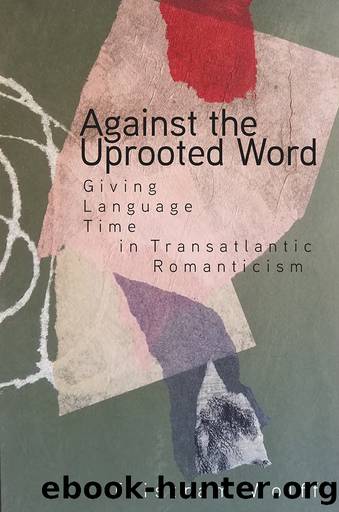Against the Uprooted Word by Wolff Tristram;

Author:Wolff, Tristram;
Language: eng
Format: epub
Publisher: Stanford University Press
Published: 2022-06-15T00:00:00+00:00
âWORDSWORTH, âESSAY, SUPPLEMENTARY TO THE PREFACEâ (1815)
Writing in 1810, Wordsworth suggested that language could be either an ambient force âlike the power of gravitation or the air we breathe,â guaranteeing âcommunion with the inner spirit of things,â or it could be that âcounter-spiritâ that like âpoisoned vestmentsâ would slowly eat away at an âindividual or people.â Curiously, by then, this imperceptibly contaminating weight on thoughtâthis bad gravityâseemed to Wordsworth to âdissolveâ the integrity of communal feeling, and to âalienate [the victim] from his right mind.â95 I say curiously because, as we have seen, both he and Coleridge viewed dissolving and melting as part of the poetâs job. I turn now to the ways the early radical Wordsworth narrated the poetic act of melting down associations as performed not only by âthe genius of the poet,â as in the epigraph to this section, but also upon the linguistic agent; and I close by thinking about how an outside linguistic force, for Wordsworth, may also be aligned with alienation.
In drawing out the moment both he and Coleridge take as disintegrative, Wordsworth spends much more energy than his friend modeling this negative stage of association. Wordsworth did, however, compose for Lyrical Ballads a series of poems âon the naming of places,â which hint at his version of Coleridgeâs coinages, tending to express how arbitrary names occur to the namer in relay with natural (involuntary) circumstances under various passions or compulsions. Wordsworth frames the sphere of arbitrary linguistic âfluctuationsâ within a shared indebtedness to the impersonal temporalities of natureâwith the reciprocal effect, as Kevis Goodman and Alan Bewell have shown, that nature itself bears the legible traces of historical layers, in histories that mix with the âearthâ artifice, passion, violence, love, and loss. For Wordsworth, mind and nature interact as âtemporal structures, built up layer upon layer like a geological formationâ; a striking linguistic version of this comes in âHart-Leap Well,â to which I will turn shortly, and which constitutes a kind of mythic kin to the âPoems on the Naming of Places.â96
I have said that Wordsworthâs ânatureâ might be understood as the name of a relationship to timeâs passage. Setting in motion what Coleridge called the âinfluxesâ from the âshifting elementsâ of nature, Wordsworth dwelt on its âlow breathingsâ and âindisputable shapes,â allowing the receptivity celebrated by both poets to leave a much deeper impression of the gray language of nature always already in motion, until we hum physically with that âghostly language of the ancient earthâ (1799 Prelude). If Coleridge emphasizes the âgrowthâ of language in its temporal progression by way of active reform, Wordsworthâs defense of the âcommonâ pauses on the idea of re-formation as a passive procedure of imaginative disintegration. Perhaps what is called in the Preface the signature human pleasure in ârecognizing similitude in dissimilitudeâ expresses differently the thought that imaginationâs animating force breaks down distinctions to find what is held in common. Far from deriving the legitimacy of words from natural roots, Wordsworth suggests that words are more
Download
This site does not store any files on its server. We only index and link to content provided by other sites. Please contact the content providers to delete copyright contents if any and email us, we'll remove relevant links or contents immediately.
Phoenicians among Others: Why Migrants Mattered in the Ancient Mediterranean by Denise Demetriou(608)
american english file 1 student book 3rd edition by Unknown(608)
Verus Israel: Study of the Relations Between Christians and Jews in the Roman Empire, AD 135-425 by Marcel Simon(592)
Caesar Rules: The Emperor in the Changing Roman World (c. 50 BC â AD 565) by Olivier Hekster(578)
Basic japanese A grammar and workbook by Unknown(574)
Europe, Strategy and Armed Forces by Sven Biscop Jo Coelmont(520)
Give Me Liberty, Seventh Edition by Foner Eric & DuVal Kathleen & McGirr Lisa(497)
Banned in the U.S.A. : A Reference Guide to Book Censorship in Schools and Public Libraries by Herbert N. Foerstel(492)
The Roman World 44 BC-AD 180 by Martin Goodman(478)
Reading Colonial Japan by Mason Michele;Lee Helen;(469)
DS001-THE MAN OF BRONZE by J.R.A(462)
Introducing Christian Ethics by Samuel Wells and Ben Quash with Rebekah Eklund(456)
Imperial Rome AD 193 - 284 by Ando Clifford(454)
The Oxford History of World War II by Richard Overy(454)
The Dangerous Life and Ideas of Diogenes the Cynic by Jean-Manuel Roubineau(452)
Catiline by Henrik Ibsen--Delphi Classics (Illustrated) by Henrik Ibsen(427)
Language Hacking Mandarin by Benny Lewis & Dr. Licheng Gu(410)
Literary Mathematics by Michael Gavin;(407)
Brand by Henrik Ibsen--Delphi Classics (Illustrated) by Henrik Ibsen(390)
